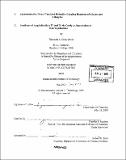Enantioselective nickel-catalyzed reductive coupling reactions of alkynes and aldehydes. Synthesis of amphidinolides T1 and T4 via catalytic, stereoselective macrocyclizations
Author(s)
Colby Davie, Elizabeth A. (Elizabeth Anne)
DownloadFull printable version (10.44Mb)
Other Contributors
Massachusetts Institute of Technology. Dept. of Chemistry.
Advisor
Timothy F. Jamison.
Terms of use
Metadata
Show full item recordAbstract
I. Enantioselective Nickel-Catalyzed Reductive Couplings of Alkynes and Aldehydes Allylic alcohol synthesis via a nickel-catalyzed reductive coupling reaction of alkylsubstituted alkynes and aldehydes was studied for ligand effects with respect to the regioselectivity and enantioselectivity of the coupling process. A class of P-chiral, ferrocenyl phosphines was designed, synthesized, and evaluated for efficacy. Ultimately, these phosphines were found to be the most effective chiral ligands for coupling reactions of this class of alkynes, providing (E)-allylic alcohols in up to 67% ee and 85:15 regioselectivity. ... II. Total Syntheses of Amphidinolides T and T4 via Catalytic, Stereoselective Reductive Macrocyclizations Total syntheses of amphidinolides T and T4 were achieved using two nickelcatalyzed reductive coupling reactions of alkynes, with an epoxide in one case (intermolecular) and with an aldehyde in another (intramolecular). The latter was used to effect a macrocyclization, form a C-C bond and install a stereogenic center with >10:1 selectivity in both natural product syntheses. Alternative approaches in which intermolecular alkyne-aldehyde reductive coupling reactions would serve to join key fragments were investigated and are also discussed; it was found that macrocyclization was superior in several respects (diastereoselectivity, yield, and length of syntheses). Alkyneepoxide couplings were instrumental in the construction of key fragments corresponding to approximately half of the molecule of both natural products. In one case (T4 series), the alkyne-epoxide coupling exhibited very high site selectivity in a coupling of a diyne. (cont.) A model for the stereoselectivity observed in the macrocyclizations is also proposed. ... amphidinolide T1 amphidinolide T4 * site of catalytic, stereoselective macrocyclization
Description
Thesis (Ph. D.)--Massachusetts Institute of Technology, Dept. of Chemistry, 2005. MIT Science Library copy: 2 v. set, in leaves. Also issued in leaves, 2 v. set. Vita. Includes bibliographical references.
Date issued
2005Department
Massachusetts Institute of Technology. Department of ChemistryPublisher
Massachusetts Institute of Technology
Keywords
Chemistry.